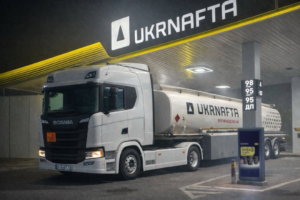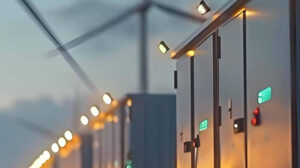
According to Fixygen, JSC Gas Distribution System Operator Ivano-Frankivskgaz will hold a general meeting of shareholders on February 27, 2026, in a remote format (poll). The key topic of the vote is the approval of a significant transaction of interest: the continuation of contractual relations for the lease of gas distribution system facilities with Gas Distribution Networks of Ukraine LLC. The announcement mentions the amount of UAH 208.98 million (including VAT).
JSC OGRM Ivano-Frankivskgaz is a gas distribution network operator in the Ivano-Frankivsk region, responsible for gas distribution and the operation of regional gas infrastructure.

Ukrnafta JSC announces commercial procurement of road transport services for light petroleum products to meet commercial needs, the company said on Friday.
“The procurement will take place on the Zakupivli.pro platform in two stages. Offers submitted by other means will not be considered,” Ukrnafta said.
As explained by the company, Ukrnafta is accepting commercial proposals for road transportation of light petroleum products across Ukraine in connection with the expansion of its network and increased sales.
“We are waiting for commercial proposals until March 1, 2026, inclusive,” the statement said.
Ukrnafta JSC is Ukraine’s largest oil producer and operator of the largest national network of filling stations, UKRNAFTA. The company has 1,807 oil and 164 gas production wells on its balance sheet.
In 2024, the company entered into an asset management agreement with Glusco. In 2025, it completed a deal with Shell Overseas Investments BV to purchase the Shell network in Ukraine. It operates a total of 663 gas stations.
The company is implementing a comprehensive program to restore operations and update the format of its network of gas stations. Since February 2023, it has been issuing its own fuel vouchers and NAFTAKarta cards, which it sells to legal entities and individuals through Ukrnafta-Postach LLC.
The largest shareholder of Ukrnafta is Naftogaz of Ukraine with a 50%+1 share. In November 2022, the Supreme Commander-in-Chief of the Armed Forces of Ukraine decided to transfer to the state the corporate rights of the company that belonged to private owners and is now managed by the Ministry of Defense.

Concorde Capital investment group and its partners have officially launched the first phase of the Encraft project, which is a network of distributed generation facilities and energy storage systems, founder and owner Igor Mazepa announced on Friday.
“Yesterday, the first gas piston started operating, and there are eight of them in total. Within two weeks, all of them will start generating power,” he wrote on his Facebook page.
According to Mazepa, the first 18.4 MW of gas piston power plants are ready for commercial operation, and electricity will begin to be sold to the grid starting on Friday, February 20.
“The initial investment amounted to approximately EUR15 million, most of which was covered by Concorde’s own capital, with the remainder coming from private investors who joined the project,” said the company’s founder.
He added that the project is still expanding, and by the end of 2026, the company plans to launch another 60 MW/240 MWh of energy storage capacity throughout Ukraine.
“We would like to thank all the investors who have joined us for their trust, and we invite new investors to join the second phase of Encraft,” Mazepa said to potential investors.
As reported, at the end of last year, Concorde Capital planned to launch 18.4 MW of gas piston generation, which was under construction at the time, in early 2026.
In early 2025, Mazepa, with the help of four unnamed partners, purchased a 50 MW energy storage system for EUR 32 million and planned to contract equipment for a gas power plant for EUR 30 million to create a single energy complex.

Ukraine is among the thirty countries in the world with the oldest population, and almost 22% of Ukrainians are people aged 65 and older, according to Minister of Social Policy, Family, and Unity Denys Ulyutin.
“Ukraine is among the thirty countries in the world with the oldest populations. Almost 22% of Ukrainians are people aged 65 and older. That is why the Ministry of Social Policy is developing its flagship program, ”Active Longevity,” which focuses on helping older people remain active, healthy, and integrated into community life. We highly value Japan’s experience in this area and are sincerely interested in a strategic partnership,” the press service quoted Ulyutin as saying following a meeting with Japanese Ambassador to Ukraine Masashi Nakagome.
It is noted that the Ukrainian side proposed that Japan become a strategic partner in the flagship area of “Active Longevity,” specifically in the development of barrier-free infrastructure, support in providing assistive rehabilitation devices, the creation of inclusive routes, and the active integration of older people into public life.
In addition, the parties focused on the topic of housing programs for internally displaced persons (IDPs).
Among other things, the Ministry of Social Policy is interested in deepening cooperation with Japan in the field of modern rehabilitation technologies and training specialists.
“The ministry proposed developing academic exchange programs to improve the qualifications of Ukrainian rehabilitation specialists and prosthetists. The parties also discussed the possibility of investing in the development of rehabilitation facilities under the ministry’s jurisdiction,” the statement said.

In 2025, the Silpo chain launched more than 400 private label products, increasing its private label range by 20% compared to the previous year, according to the company’s press service.
One of the most successful new products of 2025 was the private label launched under the Silpo brand (gastronomic highlights of regions and countries). For example, steaks that undergo a special aging process, popcorn made from American corn, milk for strudel, as well as vegetables and berries of the highest quality. Among the popular private label products are Winetruck wines, Chixy chicken chips, Premia jerky and kabanos, Mo? mochi, Ma? macarons, Premia cleaning wipes, and others.
In total, 24 private labels are currently available in Silpo supermarkets. Private labels are represented in all product categories, except for tobacco products and gardening supplies. In 2025, 82% of private label sales were for food products, and 18% were for non-food products.
In 2025, the Silpo chain collaborated with over 250 suppliers to manufacture private labels. Of these, 76% were Ukrainian manufacturers and 24% were foreign partners. Supporting Ukrainian businesses remains a strategic priority. Foreign suppliers are involved in categories where there are no local offerings or where the product requires authentic origin.
Among the partners are companies that continue to operate in frontline regions. These are manufacturers from the Kharkiv and Kherson regions. In particular, Hladoprom manufactures the classic range of ice cream under the Premiya brand, Truff Royal manufactures confectionery products, and the Kherson Butter Plant manufactures dairy products.
In 2026, Silpo will continue to develop its own brands. The focus is on new dairy-free Feels Good products, expanding the range of frozen products, in particular Mo? and Ma? desserts, as well as launching handmade products — vareniki, pelmeni, pancakes, and Kraftyar syrniki. Other plans include developing a line of products selected by Fozzy Group brand chef Marco Cervetti, launching a new beauty brand called Rimmi, and developing the alcohol category.
Silpo-Food LLC, which develops the Silpo chain, was established in early August 2016. According to YouControl, the founder of the LLC is PJSC “Closed Non-Diversified Venture Corporate Investment Fund ”Retail Capital” (100%, Kyiv), and the ultimate beneficiary is Volodymyr Kostelman. As of early December, the chain had 306 stores in 62 cities of Ukraine and four Le Silpo delicatessen markets in Kyiv, Dnipro, Kharkiv, and Odesa.
As reported, Silpo Food’s revenue for 2024 increased by 9.8% compared to the previous year, to UAH 93 billion. At the end of Q3 2025, the company received UAH 956.6 million in profits, while in the same period of 2024, the company received UAH 767 million in losses.
It is part of the Fozzy Group, which has more than 826 retail outlets throughout the country. The company develops retail chains of various formats: Silpo supermarkets, Fozzy wholesale hypermarkets, Fora neighborhood stores, Thrash! discount stores, Bila Romashka pharmaceutical supermarkets, and E-ZOO pet stores.